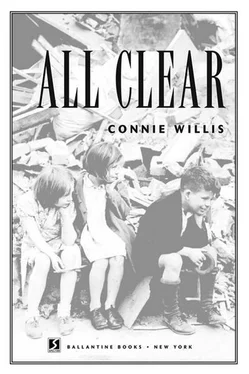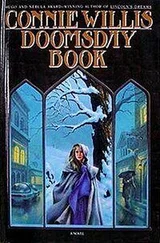Connie Willis - All Clear
Здесь есть возможность читать онлайн «Connie Willis - All Clear» весь текст электронной книги совершенно бесплатно (целиком полную версию без сокращений). В некоторых случаях можно слушать аудио, скачать через торрент в формате fb2 и присутствует краткое содержание. Жанр: Старинная литература, на английском языке. Описание произведения, (предисловие) а так же отзывы посетителей доступны на портале библиотеки ЛибКат.
- Название:All Clear
- Автор:
- Жанр:
- Год:неизвестен
- ISBN:нет данных
- Рейтинг книги:5 / 5. Голосов: 1
-
Избранное:Добавить в избранное
- Отзывы:
-
Ваша оценка:
- 100
- 1
- 2
- 3
- 4
- 5
All Clear: краткое содержание, описание и аннотация
Предлагаем к чтению аннотацию, описание, краткое содержание или предисловие (зависит от того, что написал сам автор книги «All Clear»). Если вы не нашли необходимую информацию о книге — напишите в комментариях, мы постараемся отыскать её.
All Clear — читать онлайн бесплатно полную книгу (весь текст) целиком
Ниже представлен текст книги, разбитый по страницам. Система сохранения места последней прочитанной страницы, позволяет с удобством читать онлайн бесплатно книгу «All Clear», без необходимости каждый раз заново искать на чём Вы остановились. Поставьте закладку, и сможете в любой момент перейти на страницу, на которой закончили чтение.
Интервал:
Закладка:
“Yes,” Polly said. “You were right about their being a secret weapon. Only they’re on our side. Their jumping out in front of you when you were chasing John Bartholomew and delaying you was what was responsible for your being forced into driving the ambulance that night, so that you were able to save Captain Westbrook’s life—”
“And they delayed the train.”
“Train?” Polly said.
“When we came to London. They chased a headmistress out of our compartment, and she tried to have us thrown off the train, and it made us late leaving the station. And later we found out the railway bridge ahead of us had been bombed, and Alf said, ‘It was a good thing we was late.’ ” She looked up at Polly wonderingly. “They saved my life. And the headmistress’s.”
“And you saved Captain Westbrook’s.”
“And you two and Mike and I won the war?” Eileen said.
“Helped to win the war,” Mr. Dunworthy said. “Tipped the balance.”
“But I don’t understand. If they’d lost the war before we came, then how could you have been at VE-Day? There wouldn’t have been a VE-Day, would there?”
“Yes,” Polly said, “because by 1945, you’d already saved Captain Westbrook’s life and I’d already saved Sir Godfrey—”
“But you hadn’t done that when you were at VE-Day,” Eileen said, hopelessly confused. “You hadn’t even come to the Blitz yet.”
“Yes, I had,” Polly said patiently. “I came to the Blitz in 1940, and I went to Trafalgar Square on VE-Day five years later, in 1945.”
“But what about all those years before any of us came here, before time travel was even invented? The war was lost then, wasn’t it?”
“No,” Polly said. “It was always won because we had always come. We were always here. We were always a part of it.”
“The past and the future are both part of a single continuum,” Mr. Dunworthy said, and launched into a long and involved explanation of chaos theory.
“But I still don’t understand—”
“Don’t understand what?” Binnie asked, coming in and announcing that from now on she wished to be called Florence—“Like Florence Nightingale”—and become a nurse, which put an end to the conversation.
But the next morning after Alf and Binnie had gone to school, Eileen brought up the subject again. “So because Mr. Dunworthy ran into the Wren and Mike untangled the propeller and you saved Sir Godfrey, it changed things just enough that we won the war, is that right?”
“Yes,” Polly said.
“Then there’s no reason to keep us here,” she said, “and we can go home.”
“Eileen—”
“Mr. Dunworthy, you said every historian who’s come here has altered events, and they all went back to Oxford. And after you ran into the Wren, you went back to Oxford. So now that we’ve done what we were supposed to do, they should be able to come and fetch us, shouldn’t they? Or our drops should begin working again.”
She looked expectantly from Polly to Mr. Dunworthy and back again. “We need to go check them.”
“I’ll go to the drop in St. Paul’s this morning,” Mr. Dunworthy promised.
But after Eileen had elicited a promise that Polly would check her drop on her way to the theater and had left to drive General Flynn, he said to Polly, “She may, of course, be right about the drops—”
“But if she were, Colin would already be here.”
“Yes,” he said, “and the fact that he isn’t very likely means our part in this is not over.”
“I know,” Polly said, thinking of how Major Denewell had told her and the other FANYs the war could still be lost even during that last year.
“More may be required of us before the end,” Mr. Dunworthy told her.
Including our lives, Polly thought.
She had nearly died rescuing Sir Godfrey. The next time she might not make it. Like the countless rescue workers and ARP wardens and firemen who’d died digging people out of the rubble or taking people to shelter or defusing bombs. Or she might simply be killed outright by an HE, as Mike had been, and all the other people who’d died in the Blitz and in hospitals and prison camps and newspaper offices. Casualties of war.
But still even in death, doing their bit. Like Mike. It was his death that had made her go to the Works Board and volunteer to be an ambulance driver and be assigned to ENSA and save Sir Godfrey.
“I know there’s a good chance we won’t make it back,” she told Mr. Dunworthy, and as she did, it struck her that that was what soldiers said when they were leaving for the front.
“But it doesn’t matter,” she said, and meant it. “All that matters is that Sir Godfrey didn’t die and I’m not responsible for losing the war, and that I can see Miss Laburnum and Doreen and Trot without getting them killed. And if I’m killed, I won’t be the only one to die in World War Two. I’m only sorry I got you into this.”
“We got each other into it. And we may yet get out.”
“And if not, we still stopped Hitler in his tracks.” She smiled at him.
“We did indeed,” he said, and looked suddenly years younger. “And we, like St. Paul’s, are still standing, at least for the moment. Speaking of which, when I go there to check the drop, I intend to ask to be taken on as a volunteer. I have always wanted to serve on the fire watch and help save St. Paul’s—”
He stopped, an odd look on his face.
“What is it?” Polly asked. “Are you feeling ill?”
“What is it?” Polly asked. “Are you feeling ill?”
“No,” he said. “It’s just occurred to me … I think I may already have saved it. The night I came through, I crashed into a stirrup pump, and two of the fire watch came down to investigate and found an incendiary which had burned through the roof. If I hadn’t been there—”
“They might not have discovered it till too late, and the fire—” Polly said, and stopped as well, thinking of the fire on the desk which she had put out the night they’d been trying to find John Bartholomew.
“And if my being there did save it, then it may do so again,” Mr. Dunworthy was saying, “even if I can only be at St. Paul’s for two weeks. But you will need to help me persuade them. And convince Eileen.”
Convincing Eileen proved to be the more difficult of the two. “But it’s dangerous,” she said. “The north transept—”
“Won’t be bombed till April sixteenth,” Mr. Dunworthy said. “I’ll phone in and tell them I’m ill that night.”
“What about the big raids on May tenth and eleventh? You said the entire city—”
“St. Paul’s wasn’t hit either of those nights,” he reassured her.
And it doesn’t matter, Polly wanted to shout at her. He won’t be here. His deadline will already have passed. And the chances are I’ll only have two weeks after that. If she had another task, it almost certainly lay between now and the end of the Blitz. There would be only occasional raids after that, but they’d had far fewer casualties. Which meant her deadline wasn’t the end of 1943. It was May eleventh.
But she couldn’t tell Eileen that. In the first place, she wouldn’t believe her. And in the second place, the task at hand was to convince her to allow Mr. Dunworthy to join the fire watch. So instead Polly said, “St. Paul’s won’t suffer any more damage till 1944 and the V-1 and V-2 attacks.”
“But if there won’t be any more damage, then why do you need to be in the fire watch, Mr. Dunworthy?” Eileen persisted.
“Because I may be the reason there wasn’t damage,” Mr. Dunworthy said, which didn’t help his case.
“No,” Eileen said firmly. “It’s too dangerous. The incendiaries and the roofs … You might fall.”
Читать дальшеИнтервал:
Закладка:
Похожие книги на «All Clear»
Представляем Вашему вниманию похожие книги на «All Clear» списком для выбора. Мы отобрали схожую по названию и смыслу литературу в надежде предоставить читателям больше вариантов отыскать новые, интересные, ещё непрочитанные произведения.
Обсуждение, отзывы о книге «All Clear» и просто собственные мнения читателей. Оставьте ваши комментарии, напишите, что Вы думаете о произведении, его смысле или главных героях. Укажите что конкретно понравилось, а что нет, и почему Вы так считаете.












